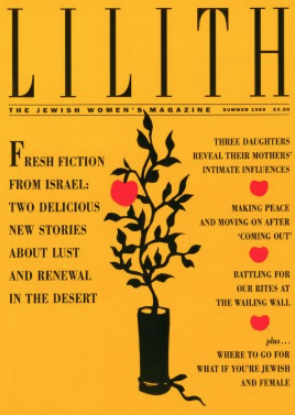
Yom Kippur in Lithuania: The “Sogerkes”
Resources for Jewish Women
Pauline Wengeroffs autobiography, Memoirs of a Jewish Grandmother, published in German in the early 1900’s, has been largely unavailable since World War II, when most copies were burned by the Nazis. In the book, Wengeroff, who was born in Bobrujsk, Lithuania in the early 1830’s, describes the traditional life of her childhood and the great changes brought about by the introduction of We stern European ideas in the Jewish community in the 1860’s and 1870’s.
Memoirs of a Jewish Grandmother, translated by Henny Wenkart, will be published for the first time in English in 1990 by KTAV Publishing House. The following is an excerpt.
The four days between Yom Kippur and Succoth were filled with joking and laughter. Everyone’s heart was light, relieved of sin and worry.
Many of these jokes were about the “Sogerkes” of Yom Kippur. It was a rare community in the forties of the last century where all the women knew how to read their prayers in Hebrew. And yet on the Sabbath, and especially on the High Holy Days, they felt a great need to pray in the Holy Tongue. So there were some literate women who industrialized their learning and, for a small fee prayed aloud to lead the others. They were the Sogerkes.
In a smaller Jewish town there might not be even one such woman, and in that case a man had to be “Soger” for the women. He crawled into a barrel, to observe the necessary separation of the sexes at prayer, and was plunked right into the middle of the women’s section to lead them. From the midst of this fortress then, surrounded by women, he read out all the holiest prayers. As may be imagined, an inexhaustible supply of funny anecdotes sprang from that barrel during the days following the Great Fast.
It was the job of the Soger or Sogerke to recite the prayers in a soulful, weeping tone so as to move the women’s gallery to tears of remorse.
Now in our community there was a woman, the wife of the butcher, who was hard of hearing. She approached the Sogerke during the Osh-amnu (We Have Transgressed) and begged her to pray a little louder. Next time she came into the butcher shop, she would reward her with an especially large and tasty liver. Unwilling to break off the great penitential prayer to reply, the Sogerke wove her answer into her weeping: “The same with the liver. The same without the liver.”
And a moment later the men were startled to hear the entire women’s gallery sobbing above them: “The same with the liver, the same without the liver!”
A woman on her way home soon after this met another just arriving at the synagogue.
“Nu, where are they? What are they praying?”
“Oh, we just did the prayer about the liver.”
“What liver? Last year we didn’t say anything like that!”
“Today, maybe, because it’s leap year….”
Henny Wenkart is a philosopher and writer who in New York City.

